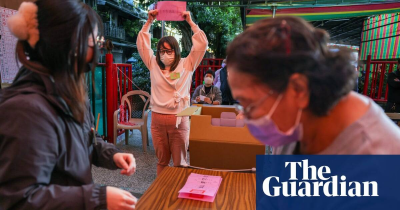The Guardian-Vote counting starts in key Taiwan election amid threats from China
January 13, 2024 4 min 686 words
这篇报道描绘了台湾总统选举日的紧张氛围,面临中国的威胁。中国指责领先者赖清德是“分裂主义者”,并威胁要“粉碎”任何台独企图。选举结果备受北京和华盛顿关注,两大超级大国在这一关键地区争夺影响力。赖清德强调捍卫台湾的民主生活方式,而对手侯友宜倾向与中国建立更紧密关系。台湾的地缘战略地位和强大的半导体产业使其成为全球经济的重要组成部分。中国在近年来加强对台军事压力,威胁潜在入侵。这次选举还见证了民进党失去议会多数地位,以及台湾人民党崛起。整体而言,台湾面临来自中国的挑战,选举结果将在地区格局中产生深远影响。
Vote counting got under way on Saturday in Taiwan’s presidential election, held under the shadow of threats from China that choosing a leader it disapproves of could set the stage for war on the self-ruled island.
Beijing criticised frontrunner Lai Ching-te, the current-vice president, as a dangerous “separatist” in the days leading up to the poll and, on the eve of the vote, its defence ministry vowed to “crush” any Taiwanese independence attempts.
Communist China claims democratic Taiwan, separated from the mainland by a 180-km (110-mile) strait, as its own and says it will not rule out using force to bring about “unification”, even if conflict does not appear imminent.
Polls closed at 4pm (8am GMT) after the electorate of nearly 20 million cast ballots in fine, sunny weather.
Results are expected on Saturday evening, with the outcome watched closely by Beijing and Washington, Taiwan’s main military partner, as the two superpowers tussle for influence in the strategically vital region.
Lai, of the Democratic Progressive party (DPP), pitched himself during a raucous campaign as the defender of Taiwan’s democratic way of life.
“This is Taiwan’s hard-won democracy. We should all cherish our democracy and vote enthusiastically,” Lai told reporters as he voted in a school gymnasium in the southern city of Tainan.
His main opponent, Hou Yu-ih, of the opposition Kuomintang (KMT), favours warmer ties with China and accuses the DPP of antagonising Beijing with its stance that Taiwan is “already independent”.
The KMT has said it will boost economic prosperity while maintaining strong relationships with international partners, including the US.
“I hope that no matter how turbulent it was during the election process, everyone will unite after the poll to face Taiwan’s future,” Hou told reporters after voting in New Taipei City.
Taiwan bans the publishing of polls within 10 days of elections but political observers say the 64-year-old Lai is expected to win the top job, although his party is likely to lose its parliamentary majority.
Strict election laws also effectively prevent media from asking voters about their specific choices on polling day.
The race has also seen the rise of the upstart populist Taiwan People’s party (TPP), whose leader, Ko Wen-je, has drawn support with an anti-establishment offer of a “third way” out of the two-party deadlock.
Located on a key maritime gateway linking the South China Sea to the Pacific Ocean, Taiwan is home to a powerhouse semiconductor industry producing precious microchips – the lifeblood of the global economy powering everything from smartphones to cars and missiles.
China has stepped up military pressure on Taiwan in recent years, periodically stoking worries about a potential invasion.
The Chinese president, Xi Jinping, said in a recent New Year’s address the “unification” of Taiwan with China was “inevitable”.
As voters cast their ballots across the strait, AFP reporters spotted a fighter jet in the skies above the island of Pingtan, the nearest point in China to Taiwan’s main island.
The hashtag “Taiwan election” was among the top trending items on China’s social media platform Weibo before it was blocked at around 9.45am local time (1.45am GMT).
Chinese warplanes and naval ships probe Taiwan’s defences almost daily and Beijing has also staged massive war games in recent years – simulating a blockade of the island and sending missiles into its surrounding waters.
The Chinese military said the night before the polls that it would “take all necessary measures to firmly crush ‘Taiwan independence’ attempts of all forms”.
The US secretary of state, Antony Blinken, met a senior Chinese official in Washington hours before the vote and stressed the importance of “maintaining peace and stability” across the Taiwan strait.
Under Taiwanese law, President Tsai Ing-wen could not run again because she has served the maximum two terms.
As well as a president, voters will also elect lawmakers to Taiwan’s 113-seat legislature.

